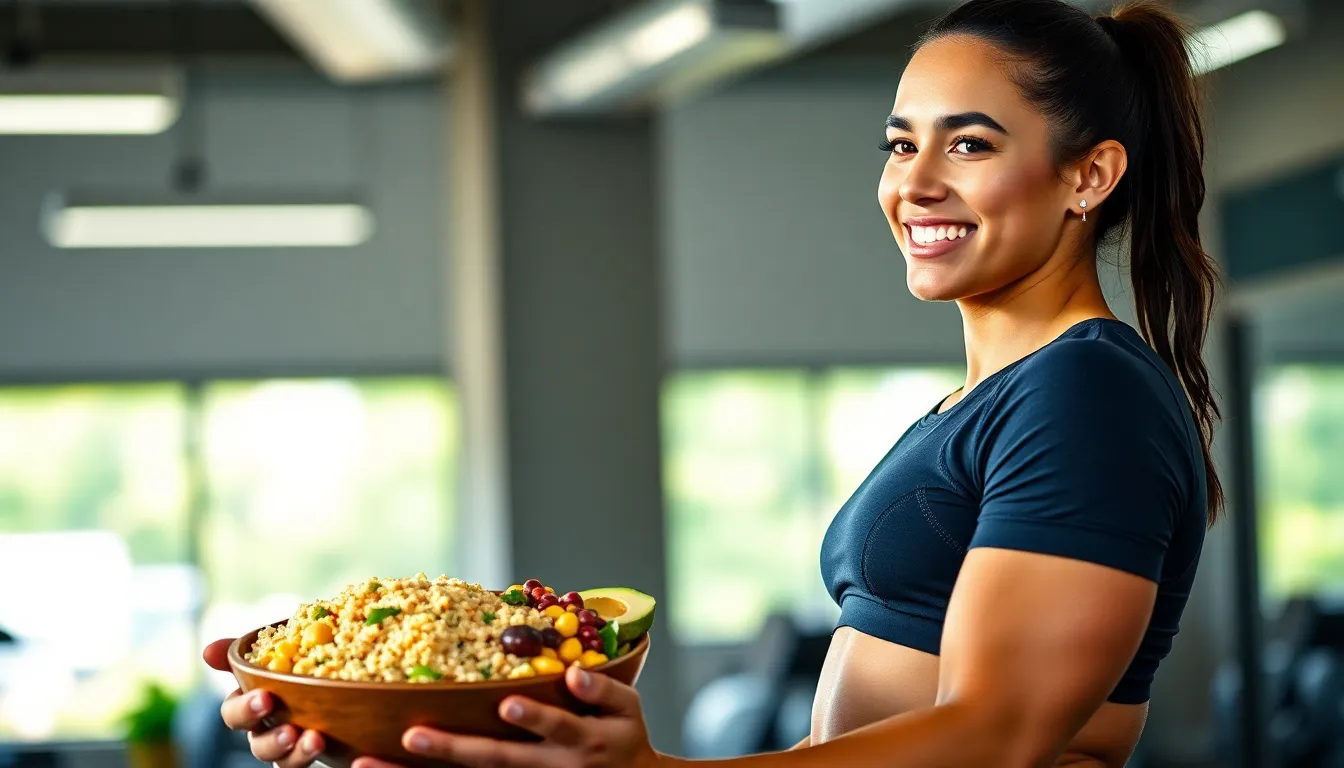Phone:
(701)814-6992
Physical address:
6296 Donnelly Plaza
Ratkeville, Bahamas.

In a world where kale chips reign supreme and tofu is the new muscle fuel, vegan sports nutrition is taking the fitness scene by storm. Gone are the days when athletes believed protein could only come from a juicy steak. Today’s plant-powered warriors are proving that you don’t need animal products to crush your goals and build serious muscle.
Vegan sports nutrition focuses on plant-based diets that support athletic performance. By incorporating nutrient-dense foods, athletes can fuel their bodies effectively while adhering to vegan principles.
Whole foods define key principles of vegan nutrition. Fruits, vegetables, legumes, whole grains, nuts, and seeds provide essential nutrients. Balance plays a role; athletes should consume a variety of foods to obtain complete proteins and necessary vitamins. Nutrient timing matters; consuming the right foods before and after workouts enhances recovery. Awareness of amino acids is crucial; combining different plant sources can create complete protein profiles.
Athletes benefit from vegan nutrition in multiple ways. Energy levels often improve due to higher carbohydrate intake from fruits and grains. Improved recovery results from anti-inflammatory compounds present in plant-based foods. Nutrient density supports immune health, which is vital during intense training. Studies indicate that many plant-based diets are lower in saturated fats, promoting heart health. By adopting vegan nutrition, athletes can achieve fitness goals while aligning with ethical values.

Vegan athletes can achieve optimal performance through balanced macronutrient intake, focusing on protein, fats, and carbohydrates.
Various sources provide essential proteins in a vegan diet. Legumes, including lentils, chickpeas, and black beans, deliver substantial protein content. Tofu and tempeh, derived from soybeans, offer versatile and rich protein sources. Nuts and seeds, such as almonds, chia seeds, and hemp seeds, contribute additional protein and healthy fats. Quinoa stands out as a complete protein, containing all nine essential amino acids. Combining different sources helps ensure adequate protein intake for muscle maintenance and recovery.
Healthy fats play a crucial role in energy balance and nutrient absorption. Avocados, olive oil, and walnuts provide beneficial monounsaturated and polyunsaturated fats. Incorporating these fats supports cardiovascular health and aids in inflammation reduction. Carbohydrates serve as the primary energy source for vegan athletes, fueling workouts and recovery. Whole grains, including brown rice, oats, and quinoa, offer complex carbohydrates packed with fiber and vitamins. Fruits and vegetables add natural sugars and antioxidants, promoting overall health and performance. Balancing healthy fats and carbohydrates enhances energy levels and supports sustained athletic performance.
Meal planning plays a crucial role in maximizing athletic performance on a vegan diet. By focusing on balanced nutrient sources, athletes can ensure they meet energy requirements and support muscle recovery.
A balanced vegan meal plan includes a variety of whole foods. Incorporating fruits, vegetables, legumes, whole grains, nuts, and seeds guarantees the intake of essential nutrients. For protein, options like lentils, chickpeas, and quinoa provide adequate amounts for muscle maintenance. Healthy fats from avocados and almonds contribute to energy levels and nutrient absorption. Carbohydrates from brown rice, oats, and sweet potatoes serve as vital energy sources. Sticking to this variety not only enhances health but also keeps meals interesting and satisfying.
Timing nutrient intake significantly impacts athletic performance and recovery. Consuming carbohydrates and protein within 30 minutes after exercise helps replenish glycogen stores and promotes muscle repair. During intense training days, athletes should prioritize pre-workout meals focused on complex carbohydrates for sustained energy. Being mindful of meal timing around workouts can maximize energy levels and recovery. Overall, aligning meal schedules with training sessions ensures athletes can perform at their best and recover effectively.
Vegan athletes often require supplements to ensure they meet their nutritional needs. Emphasizing essential vitamins and minerals is crucial for supporting overall health and athletic performance.
Vitamins and minerals play a critical role in maintaining optimal health. Vitamin B12 is essential for energy production and can be difficult to obtain from plant sources. Iron, also significant, helps in forming red blood cells and delivering oxygen to muscles. Calcium strengthens bones and teeth, while vitamin D enhances calcium absorption and supports immune function. Omega-3 fatty acids, found in algae-based supplements, contribute to heart health and reduce inflammation. Zinc, another important mineral, aids in immune function and recovery. Athletes should assess their individual needs and consider these nutrients to optimize their performance.
Selecting the right supplements involves careful consideration. Certified third-party testing ensures quality and potency. Vegan athletes frequently choose protein powders derived from peas, rice, or hemp for convenient protein intake. Creatine, often sourced from vegan-friendly options, can enhance strength and muscle mass. Consider products enriched with vitamin B12 or omega-3 derived from algae. Multivitamins designed specifically for vegans can provide additional nutrient coverage. Consulting with a registered dietitian helps tailor supplement choices to personal needs and fitness goals. Prioritizing nutrient-dense options supports overall well-being and athletic performance effectively.
Vegan sports nutrition is transforming the way athletes approach their diets. By embracing plant-based foods, athletes can fuel their bodies with nutrient-dense options that enhance performance and recovery. The focus on whole foods and balanced macronutrients ensures they meet their energy needs while supporting muscle maintenance.
With careful meal planning and attention to nutrient timing, vegan athletes can optimize their training and recovery. Incorporating essential supplements can further bridge any nutritional gaps, ensuring they stay at the top of their game. This shift not only promotes physical health but also aligns with ethical values, making veganism an appealing choice for modern athletes.